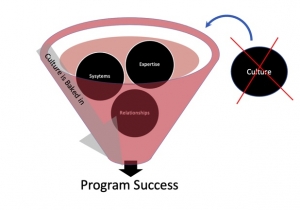From Wiki – Culture is a word for the ‘way of life’ of groups of people, meaning the way they do things. An integrated pattern of human knowledge, belief, and behavior. The outlook, attitudes, values, morals, goals, and customs shared by a society. For our purposes a “program”.
The culture of a swimming program is the outlook, attitudes, values, morals, goals, and customs shared by the team. Many coaches have asked me over the past 10 years how does a team become successful? I know we should all define our successes as they pertain to our situations but for the purposes of this entry we will agree upon success as defined by USA Swimming’s Virtual Club Championship , Club Excellence, Speedo sectional, junior national, national, and international podium results. Having led or been on the leadership teams of the Carmel Swim Club, SwimMAC Carolina, the Fort Collins Area Swim Team, and T2 Aquatics it was not uncommon for me to be exposed to some of or all of these levels of success. Each one of these clubs had their own starting points and unique set of assets and liabilities. Culture became a catch all phrase while some, more practical and less flashy key elements remained lacking during the tougher times at these and other struggling clubs. Culture, which I contend is an inseparable trait of all organizations, high performing or otherwise, was a major factor in the daily operations of these clubs if sometimes just as rhetoric. It’s this hallow rhetoric which often references glory days of past and often spoken by those who have no first hand knowledge of the complicated nature of building complex systems or the sometimes demagoguery of past leaders that is problematic. “This is how we do it” and “this is how we’ve always done it” typically pervade programs that are on the presuppose of, or are in, full blown decline. I hypothesize that there are at least three other factors that fly in the face of today’s overly produced hand holding circles and performative acts associated with trendy “culture building” practices found in the business section of Barnes & Nobles. First, is expertise. Does your staff possess the skills necessary to accomplish success in the field of competitive swimming? Without the competence, knowledge, and command of pedagogy, physiology, psychology, and swimming history a program will achieve very little despite what the anomalous dissenting views may profess. Secondly, a system by which you present your expertise over sessions, weeks, and seasons is imperative. The harsh reality is and will always be, some systems are better than others, so just having one is not enough, it must be founded on tried and trued methods, trial and error, and science . The structure by which you implement your expertise and address your lack of expertise is an apparatus that will take you 80% of the way almost every time assuming you have the expertise. “Systems run programs and people run systems.” -Michael Gerber. This is a paraphrased quote from a famed author that leads me to my last prevalent factor that accompanies success in swimming. Life, it’s about relationships and sport is no exception to that rule. The strong relationships between staff members, athletes, coaches, and parents create the lubricant necessary to move past the sticky critical confrontations that are part of youth sports and the successful actualization of high performance goals. If your system is run by people then people have to matter the most. We want whole people, people who are robust in emotional and intellectual depth and curiosity. Communicators of passion and purpose that fan the spark of the young into flames. It’s the hard work homework and the anti-buzz practices that will create what you’re looking for.

In summary, culture as an additive or cure all separate from the everyday happenings of a program packaged and sold by successful entrepreneurs and self help gurus is big business and makes for good reading but rarely results in the advertised claims. Real success revolves around the daily fostering, improvement, and the brutal honest assessment of expertise, systems, and relationships. The culture is baked in, not slathered on top.

Want to learn some more about Dryland? Sign up for our monthly newsletter, stop at anytime. No BS marketing just content and learning opportunities.
Ready to get started with GAIN? Download our introductory class.
